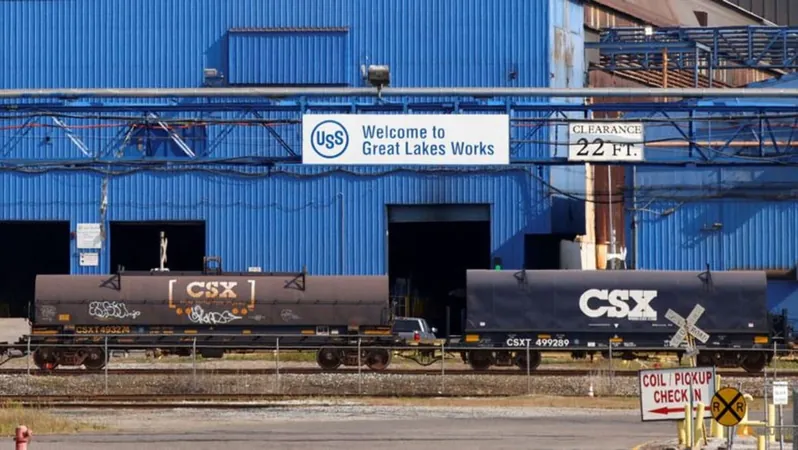
Biden Administration Blocks Nippon Steel’s $14.9 Billion Bid for US Steel—What It Means for American Industry
2025-01-03
Author: Wei
In a decisive move, President Joe Biden officially blocked Nippon Steel's ambitious $14.9 billion takeover of US Steel on January 3, 2023, citing national security concerns. This long-anticipated decision marks a significant moment not just for the companies involved but also for the American steel industry and its workforce.
Nippon Steel's bid was seen as a potential lifeline for the struggling US Steel, which has been grappling with financial difficulties and indicated it might have to idle key mills without the nearly $3 billion in investment that Nippon promised. The Japanese firm was looking to bolster its global output capacity from 65 million metric tons to 85 million metric tons a year, eyeing a long-term goal of 100 million tons.
The cancellation of the merger follows a comprehensive national security review conducted by the Committee on Foreign Investment in the United States (CFIUS), which had raised red flags about the implications of the deal on the vital supply of steel in critical sectors such as transportation, construction, and agriculture. The review process concluded with a comprehensive 29-page letter from CFIUS that outlined unresolved national security risks.
Both Biden and former President Donald Trump had publicly expressed their opposition to the merger, appealing to union voters in Pennsylvania, where US Steel is headquartered. Their stance reflects broader concerns about maintaining American ownership of key industries, particularly in an era marked by increasing geopolitical tensions.
In an effort to alleviate fears, Nippon Steel proposed relocating its US headquarters to Pittsburgh and committed to honoring existing agreements with the United Steelworkers (USW) union. However, these assurances failed to sway the administration's final decision.
Japanese Prime Minister Shigeru Ishiba had previously urged Biden to reconsider the block, cautioning that it could undermine the recent strides in US-Japan relations—particularly given the rising military and economic concerns posed by China and North Korea in the Indo-Pacific region.
The failure of the merger is significant not only for Nippon Steel but also raises concerns about the future of thousands of jobs at US Steel. The USW union accused the company of using threats of job losses as a tactic to pressure the government, categorizing this as baseless intimidation.
As the Biden administration continues to wrestle with balancing foreign investment and national security, the blocking of this merger signals a firm stance on protecting American industries from foreign control—an issue that resonates strongly in today’s political climate. This development leaves the future of US Steel and its workforce uncertain as the company prepares to navigate the aftermath of this significant decision.
Stay tuned as we analyze the implications of this landmark ruling for the future of American manufacturing!



 Brasil (PT)
Brasil (PT)
 Canada (EN)
Canada (EN)
 Chile (ES)
Chile (ES)
 Česko (CS)
Česko (CS)
 대한민국 (KO)
대한민국 (KO)
 España (ES)
España (ES)
 France (FR)
France (FR)
 Hong Kong (EN)
Hong Kong (EN)
 Italia (IT)
Italia (IT)
 日本 (JA)
日本 (JA)
 Magyarország (HU)
Magyarország (HU)
 Norge (NO)
Norge (NO)
 Polska (PL)
Polska (PL)
 Schweiz (DE)
Schweiz (DE)
 Singapore (EN)
Singapore (EN)
 Sverige (SV)
Sverige (SV)
 Suomi (FI)
Suomi (FI)
 Türkiye (TR)
Türkiye (TR)
 الإمارات العربية المتحدة (AR)
الإمارات العربية المتحدة (AR)